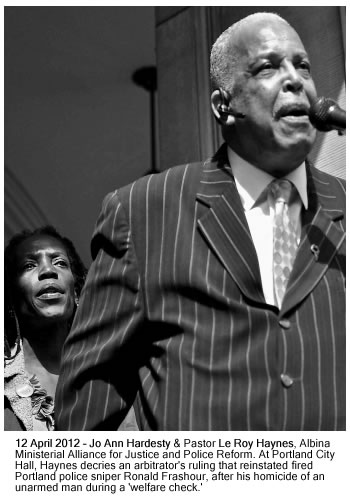For the first time, The People will be able to weigh in on a proposed Settlement Agreement between the U.S. Dept. of Justice, Civil Rights Division, and the City of Portland. Consult Hardesty provided evidence that was included in DoJ Findings of civil rights violations by Portland’s police bureau. In order to avoid trial, the City and DoJ engaged in hurried negotiations behind closed doors in late 2012.
We took the position that only a truly independent, citizen-based authority could be relied on to hold police accountable for illegal use of force. Portland City Council has never successfully disciplined an officer for such conduct. We were surprised to find the Agreement calls for $26,000,000 in new money for the perpetrators: Portland police are to be put in charge of assessing needs of those perceived to be in mental health crisis, not paramedics or others who, by training, can excel at such. Even though the DoJ declared ours a ‘self-defeating accountability system,’ they seek now an agreement to keep intact an IPR system police use to exonerate their behavior, and which generally refutes public complaints about misconduct.
Testify!
Is this agreement fair, adequate and reasonable?
Click here for details on a Fairness Hearing scheduled for 18 February.
Please note: those who submit a Testimony Form by Friday, 31 January, will be given priority. All others will be heard ‘as time permits.’ This version can be completed online. This simpler version must be printed and then scanned before being returned to [email protected]. We believe a simple email might be sufficient.
Judge Simon will allow individuals to testify for five minutes (a large improvement from the 120 seconds Mayor Adams permitted, over a document we had not seen, in 2012). What should interest our coalitional friends is that groups can have up to three members fill a half hour.
Consult Hardesty if you would like to submit video testimony. There will be two public forums before the hearing. For details, see this flyer. We’ll have videographers available.


I signed up to testify and got a “thank you” email in response so yay.
I represented 2 portland police complainants in their appeal to the CRC in the last year. What I think is most sad about the CRC process is the fact that Constitutional issues are not being addressed. At both hearings, I discussed 4th Amendment violations, only to be met with comments by IPR that “this is not a constitutional court room” (or something essentially to that effect). I pointed out that being up to date with Fourth Amendment law is explicitly provided in the PPB police manual, so if something violates the Constitution, it also violates PPB police policy–I hope. Basically, the CRC (who did not seem very interested in the Constitutional case law I was spitting off) ignored the clear Constitutional law that says reasonable suspicion alone does not allow officers to go inside suspect’s pockets when what they feel during pat down is not a weapon or contraband. In this complaint, a 4’10’ black woman was stopped, because the police believed she matched the description of a 5’6 hispanic man, was patted down, and the inside of her pockets were searched. In the second complaint, a man was called a “pimp” after he was seen talking to a black woman when coming off of the bus. The police findings said he gave consent to search. The complainant’s statement revealed he gave consent because the officers had put the complainant’s hands on top of his head, and the officer’s hand were on top of his as another officer searched inside his pockets. I may be wrong, as I am only a 2nd year student, but I do not believe you can give consent to search when you are already seized. Wrong or not, I was dismayed by the failure to inform CRC members of constitutional issues and the failure by IPR and police department to evaluate these issues.
Thank you, Briana. We met recently with a Mayor Hales policy adviser. This person waived off all discussion of police accountability, blurting out, “I don’t know anything,” and then basically saying it wasn’t her job.
I got to thinking. Don’t these folks take an oath to defend the Constitution? Maybe we ought to ask that CRC members take a similar oath … only more seriously.
We have heard testimony that Portland Police, engaging in ‘mere conversation,’ approach with the question, “You don’t mind if we search you, do you?” Though it may be refusal, ‘no’ is logical consent; a ‘yes’ is also read as consent.
Soon we’ll post a League of Women Voters of Portland analysis depicting several ways CRC inhibits the pursuit of justice.
Pingback: Detention Without Trial | Consult Hardesty